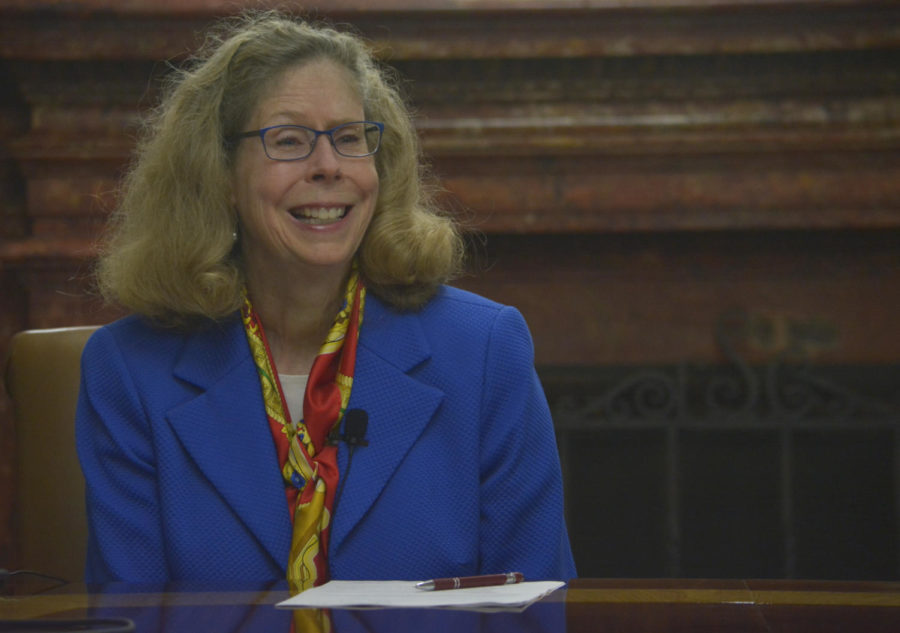Iowa State President Wendy Wintersteen: A Q&A with the President
Katlyn Campbell/Iowa State Daily
Iowa State University President Wendy Wintersteen met with Iowa State Daily editors on Aug. 16 to discuss the upcoming academic year, diversity and inclusion, tuition and the Campus Climate survey.
August 19, 2018
As President Wendy Wintersteen is entering her first full academic year as president, she said that she is excited and ready for the year.
Wintersteen said that after her selection as president on Oct. 23, 2017, while she wasn’t scheduled to start until Nov. 20 she immediately began shadowing then-interim president Ben Allen.
The Iowa State Daily had the opportunity to sit down with President Wintersteen on Aug. 16 to discuss some topics of focus going into the academic year.
Q: What are you looking forward to this upcoming academic year and what have you been focusing your efforts on this summer and hope to emphasize as the majority of students return this fall?
Wintersteen: [Wednesday] I was over in Maple and Larch handing out candy while other people carried heavy boxes to help students move-in. It’s just so much fun to say hello to new students and hear where they’re from and what they’re going to study or what they are studying and meet their parents.
This is an exciting time on campus to start a new year. Everybody gets a chance to think about what their goals are and what they are going to do. Of course that includes myself as well, so a great start to the new academic year from my perspective.
Q: You’ve been in your position for almost a year… how do you feel that you’ve transitioned into your role and what has this experience been like so far?
Wintersteen: It’s such an honor to serve as the 16th president of Iowa State. I say that everywhere I go. I just feel blessed to serve the institution that I love and that I’ve worked at for so many years. The transition, I think, has been very rapid.
I think we’ve had a good year of conversations, of listening and not only doing that with various groups on campus but also out in the state.
So, it’s nice to be able to stand up and ask students, faculty and staff, stakeholders and Iowa citizens what do they think of Iowa State? What has been there experience and what can we do to improve?
Q: What retention efforts are being made for students of minority groups?
Wintersteen: What we do in our multicultural student center, what we do with our multicultural liaisons in every college, the work that they do with our student advisors, all of this makes a very important difference.
This fall we will be having a set of discussions also about the campus climate survey that we did last year and so those discussions will be important and we have a set of four groups that are going to be leading a kind of targeted meetings and discussions about the results, what we can learn, what we can do differently.
So we know that there are things that can be improved and that by listening and hearing, what the feedback was and that sort of thing that were going to be able to do that.
Q: Are there any areas in the campus climate survey results you found particularly problematic? Is there anything positive you would like to highlight from the survey?
Wintersteen: Well, its always an interesting thing when you do a survey like this. First of all, you wish there could have been a higher response rate. How do you get everyone to respond at a higher rate. So that was a little disappointing, but certainly understandable.
What I’m very happy about on the survey is that we do these surveys. That we are willing to hear back. That we want to know what people are thinking. It’s easy in a survey to get focused on what I would call some of the negative experiences, but we also know there have been individuals reporting positive experiences as well.
Q: Attorneys representing clients in recent Title IX and civil rights litigation against Iowa State, which have now been settled, said Iowa State has made changes to their processes in responding to sexual assaults and have described those changes as “positive.” Can you confirm that changes have been made and describe what those changes are?
Wintersteen: I believe working with Student Government, starting the Green Dot program, I think that program elevates the issue. It says everybody can be apart of this community together and if you see a situation developing, you can be trained to understand what your options are in terms of being able to help. So I think that program is very important.
In addition, Iowa State police chief Michael Newton has been doing a fabulous job to reach out to students to educate and assist. We went through a lengthy conversation on the issue of sexual assault and we agreed that our policy is to begin by believing, and then you investigate.
Newton was very clear in these discussions that over the history of time, police departments often didn’t believe women who came forward and said they had been sexually assaulted. We also made room in our budget to add another investigator.
These things add up to hopefully try to change what our culture is about this issue.







